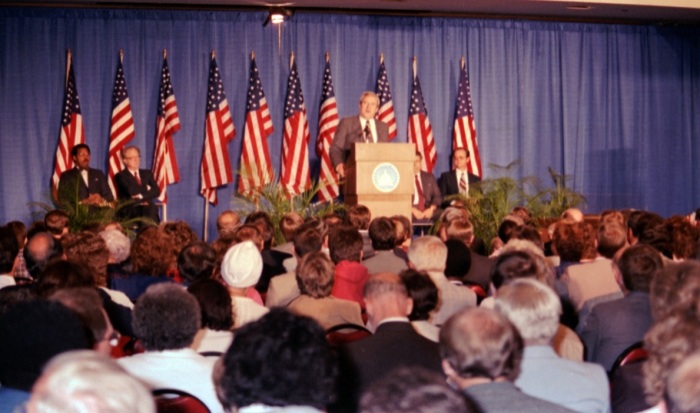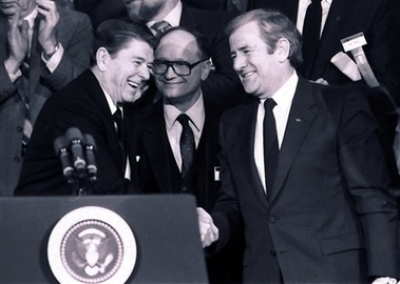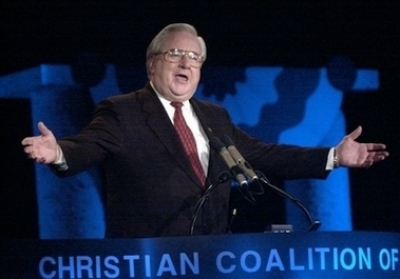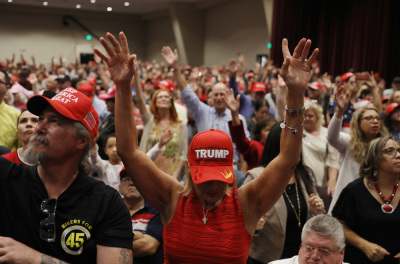Does the Moral Majority still impact American politics today?
Conservative Christians discuss impact, legacy and ongoing relevance of movement

Editors' note: This is part 4 of The Christian Post's year-long articles series "Politics in the Pews: Evangelical Christian engagement in elections from the Moral Majority to today." In this series, we will look at issues pertaining to election integrity and new ways of getting out the vote, including churches participating in ballot collection. We'll also look at issues Evangelicals say matter most to them ahead of the presidential election and the political engagement of diverse groups, politically and ethnically. Read part 1, part 2, part 3, part 5 and part 6 at the links provided.
The Moral Majority was the most influential 20th century conservative Christian political advocacy group in the United States, according to prominent Christian activists who credit the movement with making the religious right a force in American politics today.
Founded by the Rev. Jerry Falwell in 1979, the Moral Majority advocated for conservative positions on issues like abortion, homosexuality and school vouchers. It also helped millions of Christians register to vote.
Although the organization dissolved in 1989, many believe the Moral Majority continues to have a lasting impact on 21st century U.S. politics.
The Christian Post spoke with longtime conservative Christian activists to discuss their memories of the Moral Majority, its long-term impact, and what, if anything, they believe has replaced it in the modern day.
The ‘booster rocket phase’ of Evangelical politics

Gary Bauer, a longtime conservative Christian activist who served as head of the Family Research Council from 1988-1999 after serving under President Ronald Reagan in the 1980s, told CP he was "assigned to work on the values issues” during his time in the administration, including school prayer, sanctity of life issues, and school choice.
“That election in 1980, that was the election where there was such a dramatic shift of Midwestern Catholics and Southern Evangelicals from the Democrat Party to the Republican Party,” Bauer said, adding, “these issues were the things that drew those voters to Reagan."
Bauer, who now leads American Values, said he began representing the White House at Moral Majority meetings so that he would “become well known in that community.”
The activist told CP that Reagan was aware of the importance of “promoting traditional American values” and, along those lines, “became the first president to regularly refer to the sanctity of life in the State of the Union address."
“He issued sanctity of life proclamations during his presidency,” Bauer continued. “It’s been forgotten now, but he actually, while president, wrote a pamphlet, a little booklet, just on the issue of the sanctity of life, which had never been done before by a sitting president, or any president really.”
Another item championed by the Reagan administration, according to Bauer, was to require federal bodies to have “the pro-family equivalent of an environmental impact statement” whenever they proposed new rules.
“Under the law today, if you are building a project, you've got to file a statement on how the project will impact negatively on the environment,” he explained. “So, we put out an executive order that required every government agency, when they proposed any regulation or sent the regulatory proposal to the White House, to include in that what the impact would be on the family.”
Ralph Reed, founder and chairman of the Faith & Freedom Coalition, who in 1995 was the subject of a Time magazine cover story about his activism, worked alongside the Moral Majority in the 1980s.
“I was in North Carolina in 1984 when the Moral Majority was a major player in turning out Christians and mobilizing Christians. Dr. Falwell came to North Carolina on a couple occasions, and I got the opportunity to visit with him,” Reed added.
“I also worked with a guy named Lamarr Mooneyham, the head of the North Carolina Moral Majority. He was the head of the state chapter, and I was organizing Christian young people, so we collaborated on that. And then Dr. Falwell spoke at a number of student conferences that I organized in the '80s.”
Shortly after Falwell shut down the Moral Majority in 1989, Reed was hired to serve as the first executive director of the Christian Coalition, a similar organization founded by televangelist Pat Robertson.
Reed saw the political work of Robertson and Falwell as being the “twin engines” of the “booster rocket phase of the re-engagement of Bible-believing Evangelical Christians” in national politics following generations of a “self-imposed internal political exile that dated back to the Scopes trial in 1925.”
“Falwell was an enormously influential figure in fundamentalist and Independent Baptist circles. He proved to be a remarkably adept strategist and operator who was able to build a broad coalition that included pro-Israel Jews, Mormons, and Southern Baptists, among others,” Reed continued.
“In other words, he showed himself to be far more ecumenical than I think anybody would have anticipated. In working with others whose theology he did not share, he blew the trumpet and issued the clarion call for Christians to come out of the pews and get into the precincts and make a difference.”
While viewing the Moral Majority as “indispensable to the rise of Evangelical civic engagement in the late 20th century,” Reed felt the group was “sometimes limited in its tactical and strategic prowess.”
“They did rallies all over the country that mobilized and activated Christians, but in terms of building a county-by-county infrastructure or a state-by-state infrastructure, or a precinct-by-precinct trade worker infrastructure, that never really happened at Moral Majority. That ended up being the work of the Christian Coalition in the 1990s,” Reed said.
Kris Ullman is the president of the conservative group the Eagle Forum, a group whose founder, anti-feminism activist Phyllis Schlafly, often worked with Falwell on various political issues.
Ullman moved to Lynchburg, Virginia, with her family as a teenager, which meant she “heard a lot about the Moral Majority and Jerry Falwell."
“I did grow up in a very conservative, pro-life family,” she said. “It was nice at that time to know that there was an organization of primarily Baptists who were fighting on a lot of the same issues.”
“Knowing that there was this group of very conservative citizens and this organization that was rallying conservatives to the pro-life, pro-family cause had a big impact on me.”
Galvanizing people of faith

When looking at the long-term impact of the Moral Majority, Bauer said an example of the enduring influence is found in the still-existing voting bloc of religious Americans.
“The group of people that are motivated to vote based on their views on the role of the family, the role of religion in our society, those kinds of issues, which continues to be a significant voting bloc in American politics,” Bauer said.
“Particularly on the Republican side, candidates (presidential and congressional) will do all sorts of things to try to signal to those voters that they're going to be somebody that would be sensitive to those concerns, try to represent the values of those voters.”
Bauer believes that the rise of Donald Trump was an example, pointing out that, initially, “there were questions that values voters had about whether he was the real thing or not.”
According to Bauer, Trump’s decision to have Republican Gov. Mike Pence as his running mate in 2016 and his promise to fill Supreme Court vacancies with pro-life nominees helped him make much-needed inroads with conservative Christian voters.
“Trump directly said, ‘I will fill any Supreme Court vacancy that occurs in my presidency with nominees who are committed to the sanctity of life,’” he noted. “Even George W. Bush wouldn't say that. He used to say, ‘Well, I'll put strict constructionists on the Supreme Court.’"
“Not only did Trump say it — and I think that had a great deal to do with his election — he got three opportunities and appointed three justices that fulfilled his promise and, as a result, Roe v. Wade was overturned.”
Ullman believes that when the Moral Majority was formed, it “was a time where political activism on behalf of religious people was really just beginning.”
“It was a time where [people of faith] started to think that they could have an impact on politics through elections, on public policy through issues. I think that they galvanized religious people to get more involved in the political process,” she added.
“Before, people kind of thought that your religion, your faith and your politics were meant to be kept separate. They were one of the groups that really allowed people to get involved and to realize that they could take their faith into the public square.”
Reed also saw the work of the Moral Majority and Robertson as being a decisive turning point that dramatically changed the look of U.S. politics.
“If Jerry Falwell in 1979, and later Pat Robertson with his endeavors, had not made it clear to Evangelical Christians, Bible-believing Christians, that they had a moral and a spiritual obligation to bring their values into the public square and make a difference in public policy, I think we'd have a very different country today,” Reed said.
“Dr. Falwell was a historic figure in more ways than one, but just the difference that he made politically in the trajectory of the United States was a historic achievement by itself.”
'More fractured than we were in the '90s'

Reed said another “clear” example of the “long-term impacts” of the Moral Majority are the many born-again Christians who hold or recently held positions in the federal government.
“I mean, you got a born-again Christian as Speaker of the House. You had under Donald Trump probably more conservative and Evangelical Christians serving at every level of government,” he said.
“Whether it was Sarah Huckabee as press secretary, or Dina Powell who was deputy national security advisor, Ben Carson in the cabinet, Sonny Perdue in the cabinet, Sam Brownback at the State Department, Mike Pompeo at the State Department, Betsy DeVos at Education. I could just go on and on and on.”
There are many Christians in federal government that “most folks don't even know," Reed said. “They're not household names, they're staffers. But they all came out of the pro-family and pro-life movements. And all of that is a legacy of the Moral Majority and the work that came after it.”
Regarding what group, if any, currently serves as the replacement for the Moral Majority, Reed cited groups like his organization, Faith & Freedom Coalition, the Family Research Council, Concerned Women for America, and Susan B. Anthony Pro-Life America.
Reed, who described the Christian Coalition as “a successor organization,” said it was “the intermediate rocket” that took conservative Christian activism “from Earth's atmosphere to other planets.”
Ullman isn't sure there is one organization that filled the role of the Moral Majority, believing that conservative Christian activism is “a lot more fractured than we were in the '90s.”
She cited examples of groups like FRC, Catholic Vote and Focus on the Family, which each seem more centered on one particular religious denomination than the Moral Majority was.
“Even though we work together on similar issues, I think what I'm seeing now is that people are being drawn towards groups that identify to a particular faith,” Ullman told CP.
Bauer believes that there are “all kinds of groups out there” that work on the "same types of issues,” listing as examples the Faith & Freedom Coalition, Focus on the Family, FRC, and the American Family Association.
He noted that Faith & Freedom Coalition, which spends tens of millions of dollars during election seasons trying to mobilize the Christian vote, does “a tremendous amount of work in elections, passing out voter guides and so forth.”
“I think it’s had a real influence on American politics,” Bauer told CP.
Bauer also believes that conservative organizations like the Heritage Foundation, which “was not started to deal with these issues,” has over time focused on family values matters, adding that the conservative think-tank “realized that this is where the real passion is for the conservative movement.”
“There's a lot of people at the state level, state family policy councils, who fight on these issues. So, it really has multiplied to be many, many different organizations,” Bauer concluded.




























